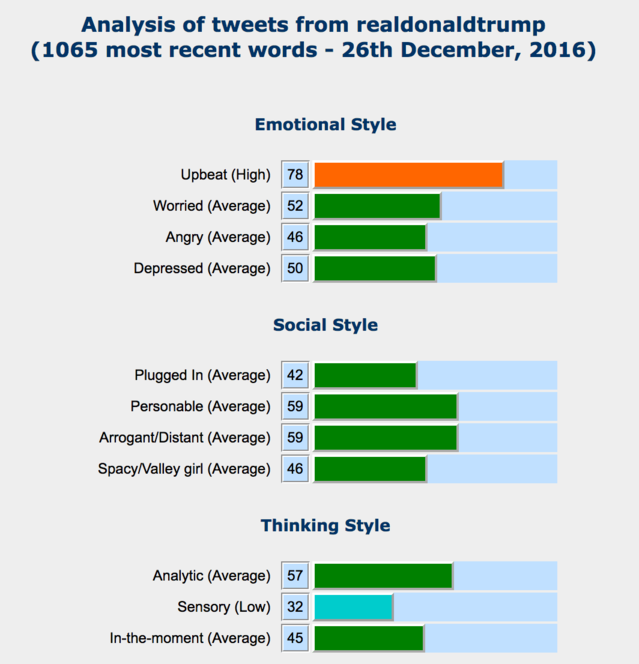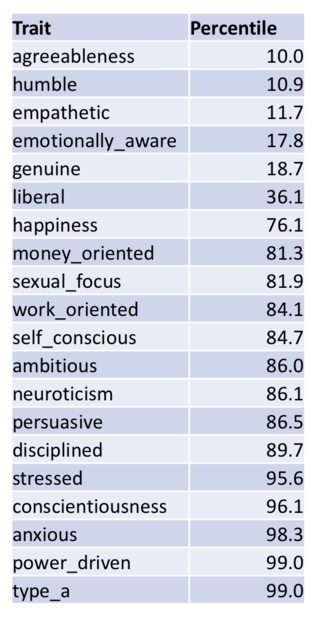Trump Psychoanalyzed by Artificial Intelligence
Source: Jennifer Golbeck
 Artificial intelligence has become quite good at analyzing people's personality traits, behaviors, and psychological states from their social media profiles. As a researcher who develops these algorithms, I'm often asked to analyze certain public features. This post begins a series of those analyses. If there's someone you'd like me to profile, submit their name here and I'll use them in a future post. I plan to post a new profile every Tuesday.
Artificial intelligence has become quite good at analyzing people's personality traits, behaviors, and psychological states from their social media profiles. As a researcher who develops these algorithms, I'm often asked to analyze certain public features. This post begins a series of those analyses. If there's someone you'd like me to profile, submit their name here and I'll use them in a future post. I plan to post a new profile every Tuesday.
By far the most popular request from this year is Donald Trump, so this post analyzes him based on his Twitter profile.
Keep in mind that these algorithms produce best guesses - they are wrong sometimes, and slightly inaccurate other times. Numerical guesses (like for scores on a certain test) tend to be within about 10-15% of the right answer, and categorical guesses (like is someone a narcissist or not) are right 80-90% of the time. These are not diagnostic tools, so take these answers with the appropriately sized grain of salt.
Summary: Trump is upbeat, power-driven, and self-assured. He makes a lot of plans, exhibits a lot of anxiety, but has very low empathy, humbleness, and is not at all an agreeable guy.
The Details
First, a tool called Analyze Words can evaluate the tone of a person's Twitter posts. Trump looks pretty average except that his posts are more upbeat than usual.
Jen Golbeck

Source: Jen Golbeck
A deeper text analysis tool is Receptiviti. It can use 10,000 words as input. I took that many words from Trump's recent tweets (about 500 tweets excluding retweets). Receptiviti painted this general picture:
article continues after advertisement
Power-driven Has a strong need to exert power and influence, and may sometimes be domineering and overly assertive. Likes to be consulted about decisions, even when the decisions are of little importance.
Secure Independent, looks out for their own best interests, and has a strong sense of who they are as a person. Does not typically seek the approval of others for validation.

Jen Golbeck
Source: Jen Golbeck
It also produces the percentile in which a person scores on a variety of personality traits. The percentile indicates what percentage of the population scores lower, so someone in the 99th percentile is in the top 1%. Someone in the 10th percentile scores higher than only 10% of people.
Here are some selected traits and scores where Trump either scores very high, very low, or where the trait itself is of interest.The table to the left shows the Receptiviti features and Trump's percentile score for each.
Trump scores very low on agreeableness, humbleness, empathy, and emotional awareness. His score for being genuine is also on the low end. On the other end, he scores the maximum possible on power drivenness and having a Type A personality, and almost as high on anxiousness, conscientiousness (a personality trait indicating planning over procrastination and a focus on accomplishing tasks), and stress. A number of other high-scoring traits are also shown in the table.
article continues after advertisement
One other interesting value is his "liberal" score. The score Receptivity computed puts Trump in the 36th percentile - certainly not high, but toward the middle of the spectrum.
Finally, a little insight into coping style. Coping styles describe how we deal with stressful situations. There are good coping styles, where someone looks for ways to resolve the stress or to get help with it, and poor coping styles, where people may avoid dealing with the problem, blame themselves, or become overly confrontational. I blogged about these a while ago here. My lab has developed a tool that will classify someone as having a good or bad coping style based on their tweets.
Our classifier says Trump has a good coping style - when he faces a stressful situation, he takes steps to resolve it so it doesn't stress him anymore.
Again, all these results are best guesses and come only from the text of Trump's tweets. They don't consider context, behavior outside of Twitter, or the kind of nuance a human can see in another's behavior. Still, it is interesting to see exactly what these algorithms predict, when we feel like they got it right, and when they seem to get it horribly wrong.
| }
|